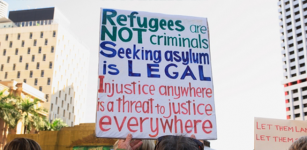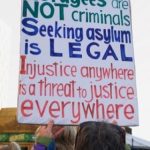Manus Island: “a nation’s shame… f***ing disgraceful”

Following a chorus of international condemnation, Actor Russell Crowe’s recently made headlines blasting the Australian Government for its horrendous treatment of detainees on Manus Island, calling the situation “a nation’s shame” and “f***ing disgraceful”.
The ensuing local mainstream media coverage has finally come around to accepting that something needs to be done about the uncertain future of detainees on Manus Island.
As the detention centre officially closed and bleak stories emerged of detainees having nothing to eat and digging for water, a silver lining came in the form of an offer from newly elected New Zealand Prime Minister Jacinda Ardern to take 150 refugees now, and provide for them on an ongoing annual basis.
New Zealand offer dismissed
In a move that has many shaking their heads, Prime Minister Turnbull swiftly rejected the proposition, prioritising Australia’s existing but slow-moving and shaky deal with the US. This is despite calls from the United Nations Refugee Agency for a swift solution, declaring the situation an “unfolding emergency”.
Mosquitoes are rife on the island and it is feared malaria could break out in the unsanitary conditions. Men are keeping vigil for fear of attack from locals – fears well-grounded after two detainees were brutally beaten by PNG Police on New Year’s Eve.
Yet, our government continues to sit on its hands regarding the people it has effective control over, and a duty of care towards.
What will happen to the detainees?
Of about 600 asylum seekers left on Manus Island, fifty-four have been accepted for entry into the US, under a deal struck with former President Barrack Obama.
The arrangement is intended to eventually re-home around 1250 of Australia’s asylum seekers, providing they meet US criteria which the current US president continues to make more stringent.
About 200 asylum seekers have had their refugee claims rejected and the Government says 100 had accepted voluntary repatriation and will leave.
For the remainder, who cannot be deported, the only choice is to move to the East Lorengau Transit Centre, which is near the main town on Manus Island.
But many fear they will not be safe there either. It’s likely they will end up in another detention centre that Australia is building in Papua New Guinea, near Port Moresby.
Ordinary people not allowed to lend a hand
When Russell Crowe offered to house six asylum seekers at his farm in Australia, and suggested many other Australians would consider doing the same, the Immigration Department quickly rejected the proposition.
Mr Crowe was widely criticised on social media for “prioritising refugees over the plight of many struggling Australians”. However, the actor retorted that no amount of backlash against his stance on the refugees would change what the Australian government “had done to these people”.
Dutton’s stance on asylum seekers
Immigration Minister Peter Dutton’s strong stance on the issue of refugees has reached new lows this year.
In September, he ordered that Australia begin cutting off the welfare payments to vulnerable asylum seekers living here, giving these people three weeks to vacate their government-supported accommodation.
Earlier in the year, 12,000 asylum seekers were sent letters imposing unrealistic deadlines for the submission of their complex applications, then accused lawyers who represent asylum seekers on a pro bono basis of being “un-Australian.”
The furore from inside and beyond the legal profession was widespread.
International pressure
For now, it seems the Australian Government is content with doing nothing further to help the plight of those left destitute on Manus Island in the wake of the detention centre’s closure. And it may well be time for international forces to ramp up the pressure.
In 2014, the United Nations found that Australia’s treatment of asylum seekers, including those on Manus Island, amounts to ‘cruel, inhuman or degrading treatment’ in contravention of international law.
UN High Commissioner for Human Rights spokesman, Rupert Colville, recently expressed grave concerns for “the welfare, safety and wellbeing of the men who remain in the accommodation compound, who are too frightened to leave.”
He too is pressuring the Australian Government to, at the very least, reinstate basic provisions such as food and water.
He says both Australia and PNG are responsible under international human rights law including the 1951 Refugee Convention, to protect detainees from harm and ensure they had access to shelter, water, food and sanitation.
He is urging the government to transfer the asylum seekers to Australia for processing.








